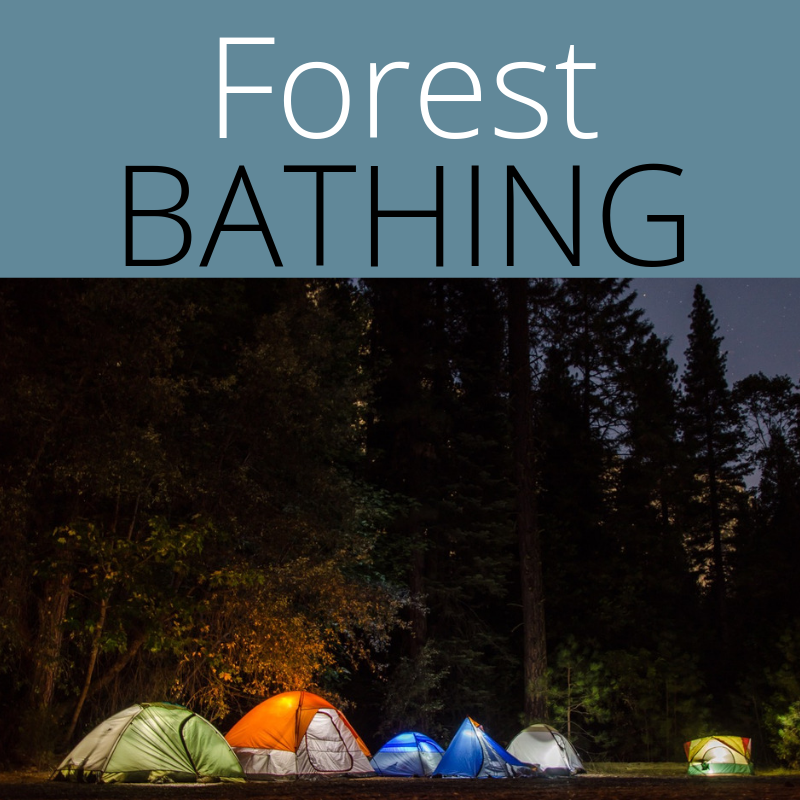Spending time with family and friends at the weekend is such a tonic. And I don’t know about you, but I love a bit of camping!

Being outdoors, in woods, or a clearing with a view, by the beach or inland it doesn’t matter.
I love sleeping out under canvas. The sound of the tent zips. Listening to the birds settling down for the night. Watching the sunset and the night draw in. And sitting around a fire, toasting the odd marshmallow, feeling free. Also cooking outside with minimal kit and, not to forget the dawn chorus or, that first cup of tea, or coffee in the morning when the dew is still on the grass.
All of that is so satisfying to ones soul. So why is this?
Research, over the last 30 years from a University professor in Japan, sheds more light on this. “Forest Bathing” or “Shinrin-yoku” means taking in the forest atmosphere, immersing your senses,synchronising and harmonising with the forest.
In Japan Yoshifumi Miyazaki, a university professor, researcher and the deputy director of Chiba University’s Centre for Environment, Health and Field Sciences, has been unravelling the relationship between stress/high cortisol levels of those who live in a urban environments, compared to what happens when there is exposure to forests and flowers.
His research showed that just 20 minutes of walking in a forest had huge benefits to lowering stress hormones in the body. And showed increased parasympathetic nervous system activity (which relaxes the body).
Yoshifumi Miyazaki noted that, of the 7 million years human beings and their direct ancestors have been alive, we have lived in nature for 99.99% of that time. Therefore, it’s a very small percentage of time we have lived in the urban environments that we have created!
Where should we really live?
We are really adapted to living in nature. So living in these artificial environments actually creates stress on our bodies. We are made to be in nature and our bodies and brains respond well to it.
He has even looked at the effects that fresh flowers have on us. Conducting experiments in work places and schools.
These experiments had people look at pink roses and leafy plants for periods of time in their work place/school and they ended up 29% more relaxed than those without the flowers.
This again struck a cord with me as I love buying fresh flowers and putting them in every room of the house. But my partner thinks I’m crazy when I come home from a run or dog walk with a small bunch of buttercups or wild garlic flowers, to pop in a vase and put on the breakfast table! Now I know why I do it. They are beautiful yes, but they also are doing something else on a real base level.
It’s boosting your immune system, lowering stress levels in the body and mind. And “Forest Therapy”; the term Yoshifumi Miyazaki coined referring to “Shinrin-yoku” backed by scientific data, is now being used as a preventative medicine in Japan.
They look at “Forest Therapy’ as a way of reducing medical costs. And the Japanese government has created now a few dozen forest therapy centres. Now wouldn’t that be amazing if it happen here. Doctor’s prescribing a walk in nature, schools building it in to their weekly curriculum.
Other research
This type of research has captured the imagination and curiosity of other researchers and Neuroscientists across the world.
In America, research was done noting that crime rates were often lower in neighbourhoods with more green areas. Not because of the trees and flowers. But because it promoted a culture of being outdoors, exploring, enjoying and embracing outdoor activities. Social connections were aided by green spaces.
Neuroscientists in the US as well as the UK have measured people’s brain wave activities in different environments. They noted that when in green spaces Alpha waves – the brainwaves that denote a more alert yet calm state were stronger.
The importance of green space
So our green spaces are important. More important than maybe we realise. And my big hope is that we regain the importance of these facts when building new housing estates, new developments as well as new schools.
It’s an investment in our mental health and the wellbeing – and a great legacy for our future generations to come.
